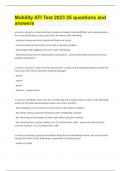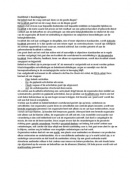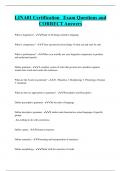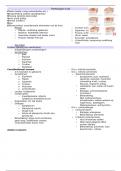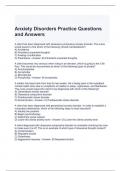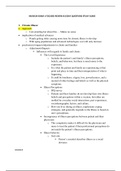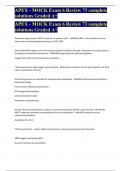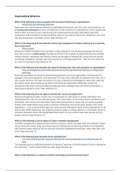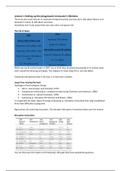Chapter 1 – Managers and you in the workplace
Learning outcomes:
1.1 Tell who managers are and where they work
1.2 Explain why managers are important to organizatonss
1.3 Describe the functonss roless and skills of managers
1.4 Describe the factors that are reshaping and redefning the manager’s jobs
1.5 Explain the value of studying managements
Who are managers and where do they work? 1.1
A manager is someone who coordinates and oversees the work of other people so organizatonal goals
can be accomplisheds A manager’s job is about helping others and not about individual achievements
There are three lines of managers they are being categorized in:
- Top managers
- Middle managers
- First-line managers
Top managers are managers who are responsible for making organizatonnwide decisions and
establishing the plans and goals that afect the entre organizatons
Middle managers are the managers between the frstnline managers and top managerss They manage
the work of frstnline managerss
First-line managers oversee the work of nonmanagerial employeess Nonmanagerial employees are the
employees who are involved in the producton of an organizaton’s its products or servicing their
customerss
Managers work in proftable and nonnproft organizatonss An organization is a deliberate arrangement
of people to accomplish some specifc purposes
All considered organizatons have three common characteristcs:
- Distnct purpose
- Deliberate structure
- People
,The distinct purpose is typically expressed through goals the organizaton hopes to accomplishs
Each company is composed of peoples people are the ones who are performing the work that needs to
be dones which is necessary to achieve the organizaton’s goalss
All organizatons develop a deliberate structure within which members do their works A structure can be
open or narrows loose or stricts
Why are managers important? 1.2
Managers are important to organizatons because of three reasons:
- Managers are important because organizatons need their managerial skills and abilites more
than ever in uncertains complex and chaotc tmess
Managers play an important role in identfying critcal issues and crafing responsess
- Managers are critical to get things dones
- Managers do mater to organizatonss because managers can create organizational values As you
can see managers do have an impacts positve and negatves
What do managers do? 1.3
Management involves coordinatng and overseeing the work actvites of otherss so their actvites are
completed efficiently and effectivelys
Efficiency refers to getng the most output from the least amount of input or resourcess Also ofen
described as “doing things right”s
Effectiveness is ofen described as “doing the right things” that iss doing those work actvites that will
result in achieving goalss
Management strives for a high efficiency and high effectivenesss
To describe what managers do management researchers have developed three approaches:
- Functons
- Skills
- Roles
All managers perform five functons:
- Organizing
- Planning
- Leading
- Coordinatng
- Controlling
Four of these functons are used to describe a manager’s works
Planning is the way of approach to set goals n> establish strategies for achieving those goals n> develop
plans to integrate n> coordinate actvites
Managers are also responsible for arranging and structuring work that employees do to accomplish the
organizaton’s goalss When all these steps are undergoings managers are organizings
The leading functon is described as when a manager is working with and through people to accomplish
organizaton goalss
, When the plannings organizing and leading is done there has to be an evaluaton to oversee if everything
goes as planneds this overseeing is called controllings
To ensure goals are met and work is done as it should bes managers monitor and evaluate performances
Actual performance is compared with the set goalss If those goals aren’t achieveds it’s the manager’s job
to get work back on tracks This process of monitorings comparing and correctng is the controlling
functons
The managerial roles refers to specifc actons or behaviours expected of and exhibited by a managers
When describing what managers do from a roles perspectves we’re not looking at a specifc person per
ses but at the expectatons and responsibilites associated with the person in that rolen the role of a
managers
The interpersonal roles involve people (subordinates and persons outside the organizatonn and other
ceremonial symbolic dutess There are three interpersonal roles:
- Figurehead
- Leader
- Liaison
The informational roles involve collectngs receivings and disseminatng informatons The three
informatonal roles are:
- Monitor
- Disseminator
- Spokesperson
The decisional roles entail making decisions or choices and include entrepreneurs disturbance handless
resource allocators and negotators
The roles of disseminators figureheadss negotiator and spokesperson are more important to higher
levels of managements The leader role is more important for lower-level managers than it is for either
middle or topnlevel managerss
The managerial functons show us clear and discrete methods of classifying the actvites a manager
carries out and the techniques they uses Howevers the role approach ofers insight into managers’ works
Managers need three critcal skills in managing:
- Technical
- Human
- Conceptual
Technical skills are the jobnspecifc knowledge and techniques needed to profciently perform work
taskss These skills tend to be more important for frstnline managers because they typically manage
employees who produce products or service customerss



